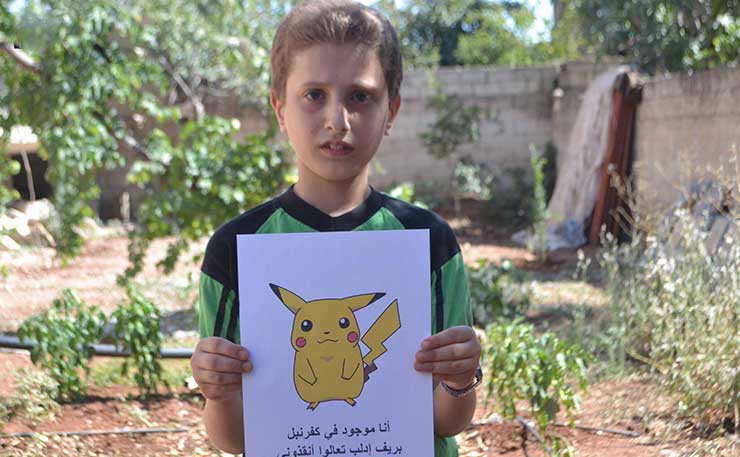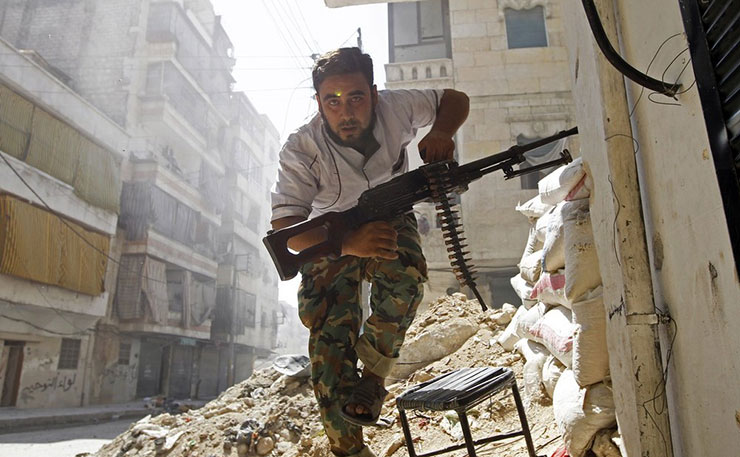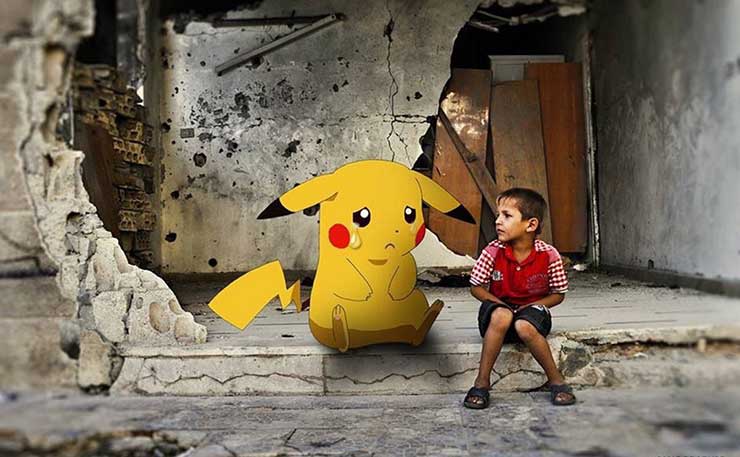Images of the child victims of war in Syria may be heart-breaking, but they actually feed the violence rather than end it, writes Michael Brull.
Every now and then, the horrors of the Syrian war once again infiltrate public consciousness in the West. The mantra is familiar. “What is happening is evil. Surely, we in the West have a responsibility to intervene.”
Most recently, this has been in the form of footage of a small child, half his face covered in blood, being pulled from wreckage. Supporters of the Syrian rebels have used public sympathy to demand that the US and its allies impose a no-fly zone on the Syrian government, and even Russia.
Omran Daqneesh, the injured boy, has unwittingly become part of a longstanding propaganda campaign to push for increased Western involvement in the Syrian war. As children are particularly effective in garnering international sympathy, they are frequently used as props to prove the evil of the other side in war.

Take this report by the ABC Middle East correspondent, Sophie McNeill. The headline asks whether images of starving Syrian children will “make the world resolve to end the conflict”.
It describes video footage of children starving in Madaya, subjected to a siege by the government of Bashar al Assad and Hezbollah. It went on to describe other atrocities by Assad.
Viewers might naturally conclude from this how the war could be resolved. Yet towards the end, McNeill observed that “Madaya is just one town of many under siege in Syria — the UN estimates that over 400,000 Syrians are living in similar conditions in 15 areas across the country. Both regime and opposition forces are guilty of using siege warfare, a clear breach of international human rights and humanitarian laws.”
That is, inhumane sieges have been imposed by both sides in the conflict. Whilst McNeill offers a cursory acknowledgement of this fact, many in Western media do not.
Video footage showing victims of this human rights violation by one side is heavily promoted across social media, making its way to Western media. The result is that Westerners are encouraged to think about how they can save Syrian children from Assad. Not how to save Syrian children from all of the war’s vicious protagonists. That would raise uncomfortable questions. As As’ad AbuKhalil observed, “none of the Western correspondents crowding in Beirut has ever reported on any of the other 14” areas under siege in Syria.
An earlier propaganda coup in Syria involved children holding up pictures of characters from the new Pokemon Go game. They held up signs saying they were Pokemon, urging the world to save them.

These images were promoted by the Revolutionary Forces of Syria Media Office. The effect was to encourage the West to save Syrian children, by tapping into the popular craze in Western countries.
As’ad AbuKhalil commented that “these spectacles are designed by American PR firms on K Street which are hired by the US government to help Syrian rebels in their propaganda campaigns.”
Presumably, the children in question don’t spend their time wandering the streets of Syria playing Pokemon Go. He complained that, “It is nothing less than criminal for adults to give children political signs to carry in a war. And no-one in the Middle East has done this more than Syrian rebels and their supporters. And it is not cute. Leave the children out of the bloody conflict in Syria.”
Very few Western journalists have actually spent any time in Syria. Many of them rely on news from social media accounts of Syrian rebels, and supporters of the rebels, who connect them with people in Syria to Skype with.
The result is mostly propaganda, because a lot of the rebel’s social media messaging is propaganda.
In April this year, Catherine Ho reported for the Washington Post that Saudi Arabia was spending millions of dollars on lobby and public relations firms in the United States. In 2014, this included consultants at the PR firm Qorvis running “the Twitter account for the Syrian Opposition Coalition.” Readers can guess what features heavily in their twitter feed.
In May this year, the British government was exposed as running its own propaganda campaign on Syria. It was “funding media operations for some rebel fighting groups”, with the goal of “boost[ing]the reputation of what the government calls the ‘moderate armed opposition’, a complex and shifting alliance of armed factions.”
These allegedly moderate armed groups were a key part of the case for war on Syria laid out by former Prime Minister David Cameron. He claimed that there were 70,000 armed rebels who were moderates, on whose behalf the UK could intervene in the war.
The British propaganda campaign involves contractors, under the supervision of the Ministry of Defence, producing “videos, photos, military reports, radio broadcasts, print products and social media posts branded with the logos of fighting groups, and effectively running a press office for opposition fighters.”
According to the Guardian, this propaganda campaign began after Cameron “failed to persuade parliament to support military action against the Assad regime. In autumn 2013, the UK embarked on behind-the-scenes work to influence the course of the war by shaping perceptions of opposition fighters.”
Presumably, the hope was that if enough Brits were convinced there were secular liberals fighting for feminist democracy in Syria, they would be willing to back another war in the Middle East.
Rebranding al Qaeda
This attempt to rebrand jihadis fighting in Syria has reached an insane peak in the attempts to rebrand al Qaeda in Syria. Al Qaeda in Syria, formerly known as Jabhat al Nusra, was founded by Abu Mohammed al-Joulani and Fawzi al-Dulaimi.
They were sent to Syria by Abu Bakr al-Baghdadi, the leader at the time of Al Qaeda in Iraq, then known as Islamic State of Iraq.
Joulani had fought with Abu Musab al Zarqawi, the founder of Al Qaeda in Iraq, and then afterwards served Baghdadi. Though JAN originally tried to hide its links to Al Qaeda, Baghdadi publicly exposed them in 2013. Joulani responded by publicly swearing loyalty to Ayman al-Zawahiri, the leader of al Qaeda, and successor to Osama Bin Laden.
In a famous interview with Al Jazeera in 2015, Joulani restated his loyalty to Zawahiri.
In his terrific book on ISIS, leading academic specialist Fawaz Gerges explained that “Al Nusra has a Salafi-jihadist worldview that is similar to that of ISIS, with the two only differing tactically and operationally.”
Gerges observed that Turkey and Qatar have lobbied for JAN to split from al Qaeda central, in the hope that this could unite the anti-Assad opposition, and increase its chances of garnering Western recognition and support. Abu Mohammed al-Maqdisi, a Jordanian theoretician of Al Qaeda, reportedly said that Zawahiri was fine with JAN splitting from Al Qaeda, other than his concern that ISIS would be the primary beneficiary.
JAN took the plunge in July, renaming itself Jabhat Fatah al-Sham. Earlier that day, “Zawahri, gave the Nusra Front his blessing to break away. In his message, Golani thanked Zawahri for putting the interests of Syrians ahead of organizational concerns.”
Despite the obvious coordination involved, and the fact that the new organisation has not claimed any kind of ideological change, Joulani said the change was made “to remove the excuse used by the international community – spearheaded by America and Russia – to bombard and displace Muslims in the Levant: that they are targeting the Nusra Front which is associated with al Qaeda”.
The US State Department hasn’t yet removed JFS from its terrorist list. But that may be on the way. Its spokesperson said, “We’re gonna have to wait and see… We judge a group by what they do, not by what they call themselves.”
Since the JFS’s momentous announcement, they have reportedly promised once again to exterminate Alawites. The excellent Independent journalist Patrick Cockburn observed that the new organisation “does not bother to conceal its extreme Sunni sectarian agenda.” For example, its offensive in Aleppo “was called the ‘Ibrahim al-Yousef’ offensive. Yousef was the name of an officer in the Syrian army in 1979, who was secretly a member of a Sunni insurgent group and orchestrated the killing of 32 Alawites and the wounding of a further 54 in a notorious massacre in the Aleppo Artillery School”.
Despite basically only changing its name, the new Syrian al Qaeda has already received sympathetic Western coverage. Last week, Murdoch’s Sky News gave a sympathetic interview to a reportedly senior figure within JFS, warmly reviewing JFS’s fight against the Assad government.
Who would have thought the day would come so soon when Murdoch correspondents would offer glowing reports on Bin Ladenites?
The humane way forward is to end the war
It is hard to tell where intentional propaganda campaigns about the Syrian war end, and where lousy media coverage begins. Reporters without Borders rates Syria as 177 out of 180 countries in the 2016 World Press Freedom Index. That is, reporting on Syria is extremely difficult and unsafe. In the West, much of the information we get simply reflects the interests of our governments and allies in the region.
There is nothing wrong with being horrified at the suffering of children in Syria. It is the way that that sympathy is manipulated by parties to the conflict that is troubling.
Syrian rebel groups hope to manipulate that sympathy to induce greater Western involvement in the war. They want the West to increase its support for the rebels, and to escalate our bombing campaign to target the government of Assad, and for the West to force Russia and Assad to stop bombing the rebels. Yet to escalate the conflict between the West and Russia could lead to utter catastrophe.
The war has already gone on for over five years. It has continued so long because so many external powers back their favoured proxies, with little regard to the suffering this has entailed.

Iran, Russia and Hezbollah back Assad, whilst Western countries, Qatar, Saudi Arabia, and Turkey back the rebels.
Many in the West think we do so because we support democracy. This is naïve, at best.
The West has no problem with the war continuing. The effect of Hezbollah, jihadi rebels, Iran, Assad and Russia being bogged down in the war for another five years would be the weakening of our adversaries. Holding out hope to the rebels that they may yet win Western support and total victory simply prolongs the war. As they think they can still emerge triumphant, they have little reason to compromise.
The truth is, the West does not want the rebels to win. It does not want Assad to win. It wants them all to continue losing.
Those of us who want the suffering in Syria to end should not let our sympathy for the most heart-rending videos on social media cloud our judgment.
The way to end the war is to de-escalate it. The first step to letting Syrians reclaim their own destiny is to wind down foreign involvement.
If we want the war to end, we should end our involvement in it, and we should pressure our allies to end the war and flow of arms as well.
Donate To New Matilda
New Matilda is a small, independent media outlet. We survive through reader contributions, and never losing a lawsuit. If you got something from this article, giving something back helps us to continue speaking truth to power. Every little bit counts.





